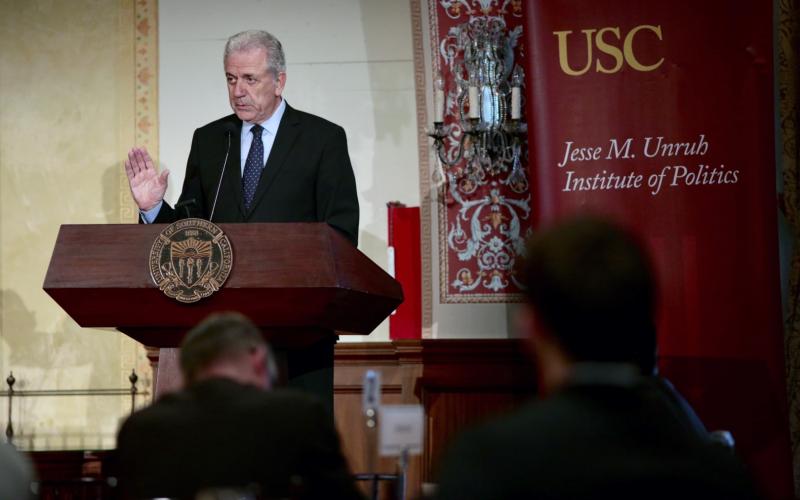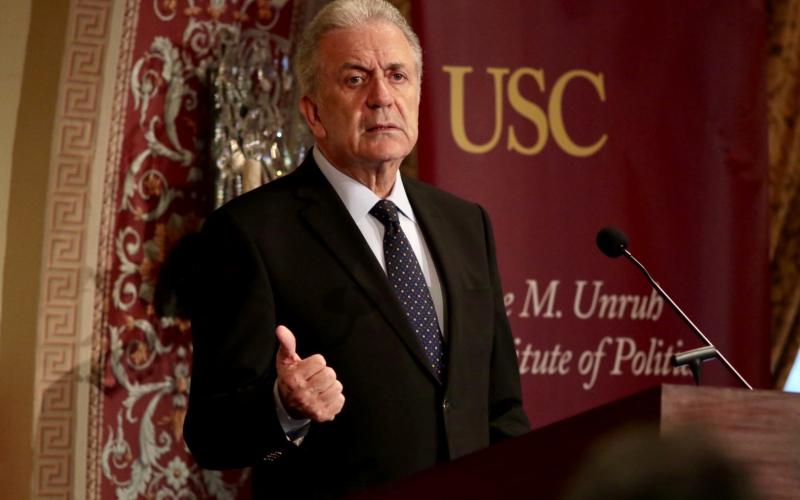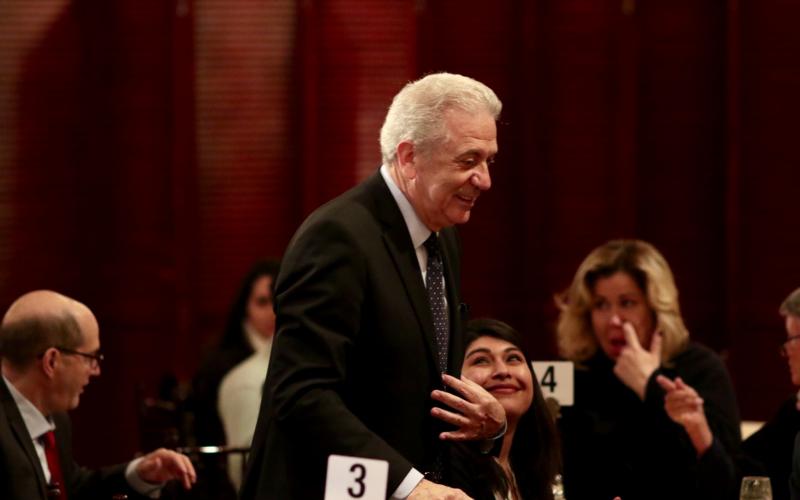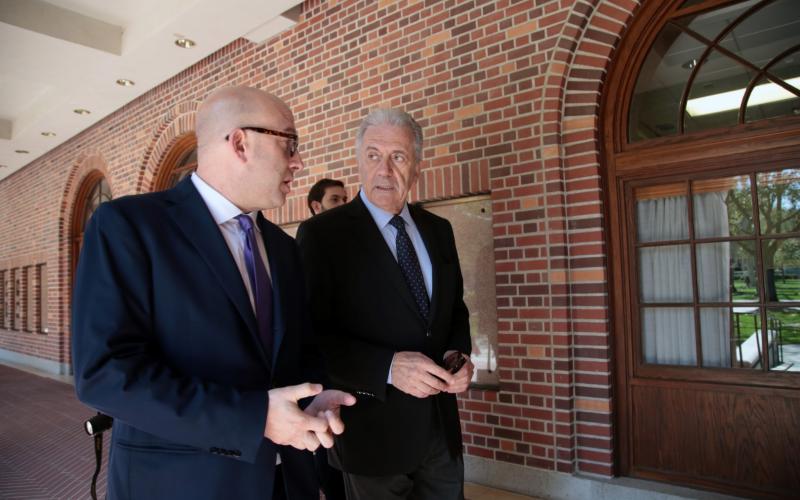Video: https://www.youtube.com/watch?v=E2nNIM7xWSM
Los Angeles, California , 26 March 2018
Dear all,
It is an honour for me to be with you today, to discuss one of the top issues on the global political agenda, and a top concern of citizens both in the United States and in Europe: how to better manage migration in the 21st century?
We live in the era of global mobility: more than 65 million people today are displaced, and more than 250 million more generally on the move.
Our world is becoming more mobile, more globalised, more interconnected. At the same time however, our societies are becoming more fractured, and more inward looking.
Less welcoming, and more suspicious of those that may be different.
We have had an international economic crisis on both sides of the Atlantic, but this has not shaken the cohesion of our societies.
No, it took the migration crisis, and the question of migration and refugees to divide us, to start tearing at our social fabric.
We are unfortunately all too familiar with the rise of populist and nationalistic discourse and its impact in elections over the past years.
Germany, France, the United Kingdom, the Netherlands, and Italy most recently.
The migration issue has also been a very divisive issue here, in the United States – and still continues to be. We are confronted with similar challenges across the Atlantic.
Europe and the United States have a longstanding, historic partnership.
A partnership that was built on common sacrifice, history, and shared values.
The post-war international system – as we know it today – was built on those values. Openness, solidarity, responsibility, cooperation, burden-sharing.
A commitment to uphold rules and norms on the basis of which we built international institutions, to prevent backsliding to the darkness of our past.
Despite the many things that are written or said in the media today about our relationship, we continue to be very much alike in the essence of our principles, in the fundaments of our democracies, and in the aspirations of our citizens.
Whether in Europe or in the US, our citizens long for the same things: they want institutions that protect, that ensure security, but also openness and tolerance, economic opportunities and freedom.
In the last three years, this balance is precisely what we have been trying to ensure and uphold in Europe.
To guarantee: mobility and freedom, openness and tolerance – but not at the cost of our security and safety. The European Union is a Union of values, which we want to uphold and protect.
But in the midst of two parallel crises on migration and security, our actions had to become much more hands-on and operational.
The major paradigm shift here, was that this hands-on approach was not some kind of power grab from Brussels. It was a direct request of our Member States.
This is why strengthening our external borders has been a key priority for all of us.
Strong and secure external borders are paramount to ensure our internal security, to fight irregular migration, and to safeguard our internal mobility.
The Schengen area in Europe is the largest cross-border and trans-national area in the world where you don’t need passport controls at the borders.
It is one of the greatest achievements of European integration in the past three decades.
But this wonderful freedom has come under risk because of irregular migration flows and recent terrorist attacks in Europe.
Border security has been a major concern of our citizens in the European Union – something which I know is also shared by many American citizens here.
I have been a proponent of better protected borders from the very outset.
But not at any cost. We have to better secure our borders, but these cannot come at the cost of our fundamental values of tolerance and openness.
We cannot and never will become a Fortress Europe.
It is true that three years ago, Europe was not prepared to deal comprehensively with a migration crisis and, in parallel, the continuous threat of terrorist attacks.
Thanks to our collective European efforts over the past three years, we are much better equipped today to do this.
Thanks to this work inside and outside the European Union, irregular arrivals to Europe today are almost 30% BELOW the number of arrivals in 2014 – this was the year BEFORE the migration crisis even started!
A first important principle in our efforts so far has been that we need to know who is crossing our borders – and we need to be able to refuse entry more effectively to those who pose a threat, and return those who have no right to stay in the EU.
In Europe, we have established so-called “hotspots” in countries like Italy and Greece, which are key control points for both migration and security.
Incoming migrants are registered, identified, fingerprinted and checked against security databases.
We have also created a truly European Border and Coast Guard.
Now, more than 1,700 European Border and Coast Guards from all across Europe support the 100,000 national border guards at our common external borders in places like Greece, Italy, Bulgaria, and Spain.
A rapid reaction pool of 1,500 border guards is also on standby in case of an emergency.
New security threats, such as the return of foreign terrorist fighters, also require thorough checks starting from our external perimeter.
Since April, systematic controls take place at the external borders, so that every person entering the Schengen area is checked against all European databases.
The use of our databases is growing exponentially.
We want to complement existing information systems with new ones, to close all gaps.
Member States have recently agreed on our proposal for a system to record the entry and exit of all third-country nationals, crossing our external borders, allowing us, for example, to better track over-stayers in the future.
We will soon also have the European equivalent of ESTA, our European Travel Information and Authorisation System, which will carry out checks on all visa-free third-country national travellers, in order to detect those who might pose a security or migratory risk, – before they reach our borders.
But it’s not enough that we have all these information systems for borders, security, and migration –we also need to make sure that they are all inter-linked.
This is why, we have proposed at the end of last year to ensure the interoperability between all the EU information systems.
The idea is that every border guard, every visa, immigration or police officer should have access to exactly the information they need, when they need it.
This will be a game-changer in the fight against terrorists hiding behind false identities.
A second important principle in our efforts has been our strengthened cooperation with third countries, our neighbours and partners outside the EU.
We have stepped up our cooperation with Turkey, with the Western Balkan countries and also with North- and Sub-Saharan African countries.
Thanks to our strengthened cooperation with Turkey, the arrivals in the Eastern Mediterranean, in Greece, have drastically dropped.
Despite whatever is written and said in the media, this cooperation continues to work to this very day.
Thanks to our cooperation across the Western Balkan Region, we have much less irregular border crossings and less migrant smuggling – though we remain vigilant.
Our work in and with Africa, including with our international partners such as the United Nations and the African Union, has also made a real difference on the ground, and in the Central Mediterranean.
For example, in the last three months, our help has enabled 15,000 migrants to return safely from Libya to their home countries.
We supported the evacuation of more than 1,300 refugees from Libya for resettlement.
I have asked all the Member States of the EU to help resettle at least another 50,000 refugees in the coming two years, including from Africa.
So far, Member States have already pledged for 40,000 places.
I was in Niger recently, with Interior and Foreign Affairs ministers of countries from the European Union, the Sahel region, West Africa and North Africa as well as international partners such as the UN, to discuss how to strengthen our cooperation in tackling migrant smuggling and trafficking in human beings.
We have committed to strengthen our operational and judicial efforts in the region, but also to step up resettlements of the vulnerable people who are being evacuated from Libya to Niger.
These are all important steps. But they cannot happen alone, and they cannot happen ad-hoc.
This is precisely why we are investing so much in the international negotiations for the Global Compacts on Migration and on Refugees with the UN.
Migration is not a European phenomenon.
It is a global one and it needs a global answer. This is why I deeply regret that the United States has pulled out of the Global Migration Compact Negotiations.
Migration will increasingly be an inherent feature of our times. The question is not how to stop it, but how to better manage it – for everyone. And for this, we need everyone on board. The third principle of our efforts in the past three years has been: fairness.
This is very simple: mindful of the essence of the Geneva Convention, those who are in need of protection should be helped in every way possible.
But those who don’t, those who abuse our hospitality, those who have no right to stay, they should be returned.
I want to however note that the American and European contexts in this regard are not the same.
The situation of the many undocumented immigrants in the United States, is something that we don’t have at this scale in Europe.
Europe advocates for a human migration and asylum policy system, where people, who apply for asylum but don’t receive it, should be returned as soon as possible.
We are reforming our asylum system so that decisions are issued quicker, and that no applicants remain in limbo or irregularity.
We are also urging and assisting our Member States to become better at implementing and really enforcing return decisions.
We are also stepping up our cooperation with key third countries when it comes to readmission agreements.
In addition, we have recently proposed a reform of our visa system, to facilitate mobility for legitimate travellers but at the same time, beef it up to detect those who are not.
We also want to use our visa policy as a leverage for countries that don’t cooperate well with us on return and readmission
Dear friends,
One thing is very clear: the global challenges of the day necessitate building and strengthening alliances. The European Union and the United States are natural allies.
We cannot turn a blind eye to problems which touch all of us equally. Our only way forward is together. Populism is not the answer. Populism is parochialism and opportunism, that can lead only to negative outcomes.
Whether in Europe or the Unites States, our citizens want our societies to be safe – but they also want them to remain open and free – legally, physically, ethically, and socially.
The truth of the matter is that, whether we talk about protecting our borders, increasing security, or better managing migration – we have to acknowledge that no country can do this alone.
Europe and the United States have a longstanding history of cooperation. At times of instability and uncertainties, the world looks to us to show leadership and to continue safeguarding prosperity and stability across the globe, with actions based on rules and values.
We have a duty to continue working together to deliver these goals. This is why, I wish to turn to you: the next generation that will inherit this transatlantic alliance, and that will have to continue working for a better and safer world.
Governments, elections come and go. But partnerships and alliances are built across generations, and they are shaped by the drive, ambition and openness of our youth.
At a time, where everything is a FaceTime call or a WhatsApp message away, where travelling to the other side of the world takes 2 days at most, young people already know that our challenges are global.
Ultimately, the choice between national and global is a false one. You all know better than many politicians today, that you can maintain and develop your identity and your community, that you can even be a patriot, whilst working towards global endeavours and solutions, in partnership with others.
Thank you.




